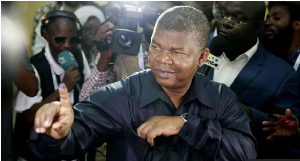The Minister of Environment, Science, Technology and Innovation, Dr Kwaku Afriyie, has warned that environmental health crisis looms in Ghana as the country emits over 1500 tons of mercury annually into the environment.
He said this consisted of 700 tonnes emitted into the atmosphere and 800 tonnes into soil and water as a result of artisanal and small-scale mining, making it the largest man-made source of mercury in the world.
Dr Afriyie, who made the disclosure at the launch of the Africa Environmental Health and Pollution Management Programme (AEHPMP), in Accra, on Tuesday, said “this is a very serious environmental challenge that calls for effective management if we have to enjoy these deposits to the fullest”.
The AEHPMP is intended to reduce exposure to mercury pollution as well as strengthening the institutional capacity to manage and regulate mercury use in artisanal small-scale gold mining and electronic waste in five African countries.
According to the minister who is also the NPP Member of Parliament for Sefwi Wiawso, the use of mercury in the artisanal small-scale mining industry is legal, but the improper handling and disposal of same has resulted in some documented cases of mercury intoxication among miners in mining communities which could lead to mercury related health problems.
He said Ghana had taken steps to reduce mercury emission in the country including the domestication of the Basel and Stockholm conventions, the passage of legislations and regulations to tame the threat of mercury and e-waste pollution in the country.
“In spite of these national interventions, we recognise that there are still gaps in our efforts to reduce the impact of artisanal small-scale gold mining and e-waste activities on human health and the environment”, Dr Afriyie said.
The Executive Director of the Environmental Protection Agency, Dr Henry Kwabena Kokofu said his outfit has undertaken educational programmes to the doorstep of artisanal miners to ensure that their operations did not jeopardise their health.
“It is, therefore, a priority to reduce, and where feasible, eliminate mercury use in artisanal and small-scale gold mining”, he said, adding that Ghana was expected to provide strategies to handle the sector.
Mr Pierre Laporte, the World Bank Country Director, said the cost of environmental degradation in Ghana per year, stood at US$11 billion, adding that “environmental degradation and unsustainable natural resources use, pose a significant risk to future growth as well as a threat to public and ecosystem health”.
In this regard, he said the World Bank was committed to supporting the government of Ghana to address environmental challenges by investing in policies and projects.
A 16-member Steering Committee to oversee the implementation of the programme, with membership from the ministries of finance, defence, agriculture, among others, was inaugurated.
After the successful implementation of the five-year US$8.7 programme, a national mercury inventory database would be developed with 10 mining communities to be trained in sage handling, and 10 clean mining demonstration centres established in 10 mining regions in the country.
It is expected to benefit an estimated one million people who are engaged in and depending on the artisanal mining industry.
Additionally, 258,180 people, who are partially or entirely dependent on refurbishing and e-waste recycling operations would benefit.
Health News of Wednesday, 14 April 2021
Source: ghanaiantimes.com.gh
Mercury pollution poses health crisis - Minister cautions
Opinions












